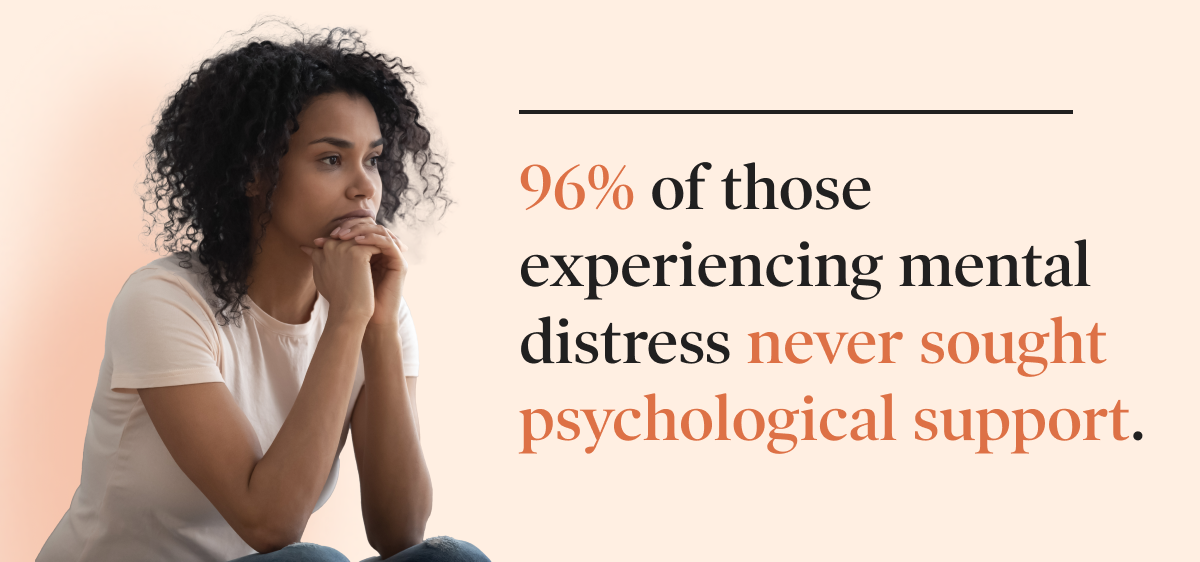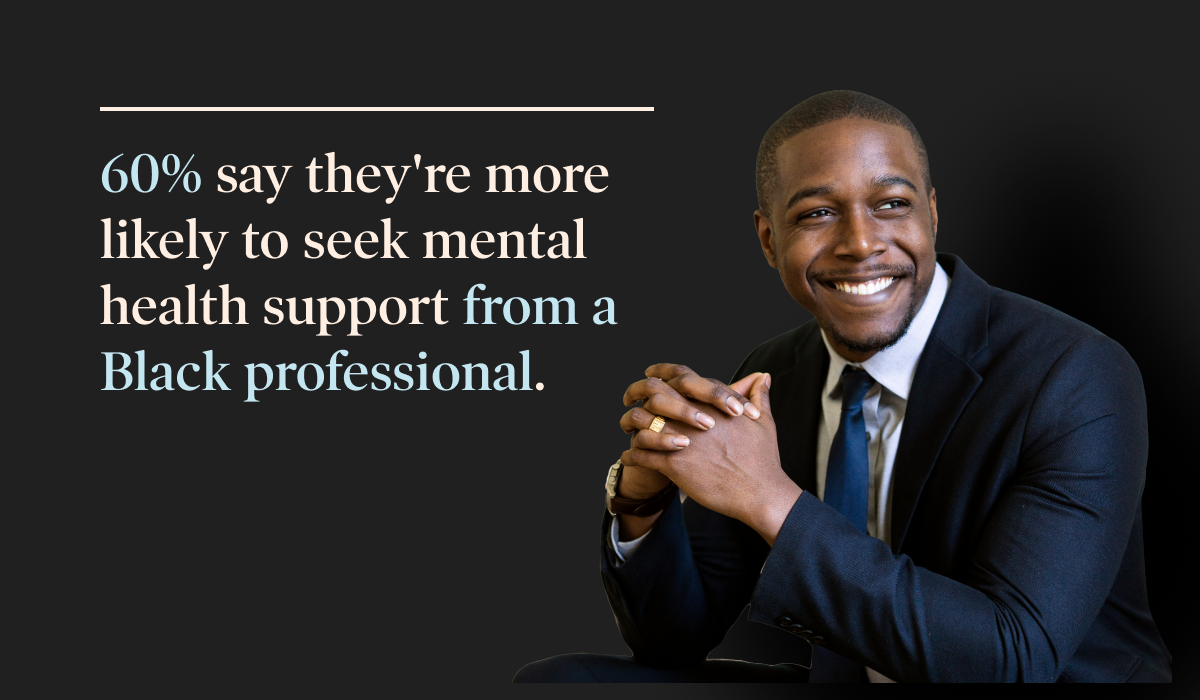A study in Ontario compared the prevalence of self-reported mental health factors and use of mental health services across the 4 largest ethnic groups in Ottawa. It found that, compared to their white counterparts, Black Canadians with poor or fair mental health were 25% less likely to seek mental health treatments.
The mental health of Black individuals is often shaped by microaggression, racism, discrimination, and inequity. The stress of these experiences may increase a person’s risk of mental illness and impact psychological well-being. Unfortunately, there are still countless barriers for the Black community when it comes to accessing care.
Stigma
There is a high degree of stigma associated with mental illness in Black communities. According to a study conducted by Ottawa Public Health, 66% of participants believe that most people would think less of someone who is affected by a mental illness. Similarly, 40% believe that seeking treatment for a mental health issue is a sign of personal failure. There is a lot of shame associated with poor mental health, and many believe it’s a sign of weakness. This widely held belief has an impact on the Black community as a whole, preventing individuals from addressing their difficulties.

Provider bias and inequality of care
Historically, Black people have been negatively impacted by prejudice and discrimination in the healthcare system. Even to this day, individuals sometimes deal with provider bias, both conscious and unconscious, which can result in misdiagnosis and inadequate treatment. This leads to mistrust in reaching out to mental health professionals.
Lack of culturally competent care
Finding a Black mental health professional in North America can be very challenging. The lack of representation and lack of culturally competent professionals – professionals who understand the dynamics and complexities of Black communities – make it difficult for someone to seek help. This is particularly true if the person feels that the professional is unable to relate to their experience or understand their point of view. In fact, a 2018 survey found that 60% of Black Canadians would be more willing to use mental health services if the mental health professional was Black.

Negative experiences
Unfortunately, there are far too many instances where Black individuals have had negative experiences with mental health professionals – either due to a lack of cultural awareness or competency, or because their experience is being minimized by their counsellor or psychotherapist. These negative experiences with mental health professionals can create a barrier for Black individuals seeking help for their mental well-being, leaving them feeling mistrustful of further assistance and overwhelmed by the prospect of continuing their search for care.
Systemic inequity
Historically, the Black community has been at an economic disadvantage. Individuals dealing with unemployment or lower-than-average income may not have access to the selection of mental health services available to those able to pay privately or access employer-covered insurance plans. In general, Black communities often have fewer mental health services or programs available to them.
What can be done
These are only a few of the many barriers that Black people face when they need mental health support. Luckily, there are ways for non-Black people, organizations, and healthcare professionals to make a difference.
Give a voice to Black leaders
Organizations and employers play an essential role in creating inclusive and supportive spaces. When developing mental health programs or initiatives, it’s critical to include Black representatives and decision-makers who can advocate for the diverse needs of their communities. Consider reaching out to Black employees and colleagues to get their feedback as well. Impactful decision-making should include the people they aim to serve.
Sign up for cultural competency training
For those serving or working alongside Black people, this type of training can help you better understand the important factors that contribute to poor mental health in Black communities. The goal of cultural competency training is to help you become aware of your own biases and help you gain the skills needed to support communities that require a culturally sensitive approach to care.
Integrate culturally responsive care
If you’re in a position to provide care or counselling, ensure to educate yourself about the community you are serving. Understanding how culture shapes experiences and beliefs, and providing care accordingly, can help Black communities become stronger and healthier. It can also build a relationship of trust between care providers and their patients.
Increase recruitment and retention of Black health professionals
Lack of representation of Black people in healthcare is an important barrier that needs to be addressed. For a person seeking care, being able to discuss your challenges with someone who can understand them is essential to proper treatment. For those in recruitment, ensuring diversity in the hiring process by including more professionals from Black communities is key.
Create awareness around available resources
Mental health resources in Black communities are limited. That being said, individuals in healthcare should familiarize themselves with programs that are offered specifically to Black communities. Here are some examples of available resources.
-
Toronto For All: Anti-Black Racism & Black Mental Health: A selection of organizations and helplines in the Toronto area
-
Black Women in Motion: A Toronto-based organization that provides consent and mental health education, advocacy, and support for Black women and non-binary people, and survivors of sexual violence
-
Black Youth Helpline: A multicultural helpline and services that focus on community development and support for Black youth across Canada
-
Resources for Marginalized Communities and Allies: Well-being and mental health resources for members of marginalized communities
-
Black mental health matters: A service in the GTA that caters to clients who typically can’t afford mental health services, and provides low-cost treatment options with a therapist who is culturally understanding
-
Black Mental Health Connections Montreal (BMHC MTL): An alliance of organizations and individuals providing services and focusing on the mental health and well-being of the English-speaking Black community in Montreal
-
The Mental Health Coalition: A Resource Library that includes resource pamphlets specifically for BIPOC and Black folks
-
Black mental Health Alliance: A community-led charity working to improve the health and well-being of Black communities in Canada
How Dialogue can help
At Dialogue, we understand that many people have a long history of negative experiences, at work and in their personal lives. This is why we’re committed to building a workplace where employees of all backgrounds feel safe, supported, and heard. We work hard to defend mental health within our organization and in our interactions with members, by providing support for various communities through our services. If you’re looking for mental health resources, learn more about our Mental Health + program.
Mental health professionals
If you’re experiencing stress, anxiety, depression, or other mental health issue, our team of mental health practitioners can help. They will work with you to develop a treatment plan and support you until remission. Consultations are 100% virtual and confidential. So if you’re not ready to talk about your mental health with friends or family, you can still get the support you need.
Self-care toolkits
Many people feel uncomfortable or unsure about speaking to a mental health professional. If this is the case for you, then self-led therapy may be a better option. Our self-care toolkits are clinically proven to help you manage everyday anxiety, stress, sadness, low mood, and more. And the best part? You can do them anytime, anywhere, and at your own pace.
Make mental health a priority today.




 Canada (EN)
Canada (EN)
 Global (EN)
Global (EN)








